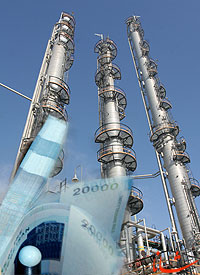Talking to PIN, the production manager added the complex’s petrochemical products met international standards, arguing that the middlemen would disappear and the goods would be available for real producers if the approved plan were put into practice.
Kazemi referred to the establishment of IMS system in Shiraz Petrochemical Complex and added the complex had succeeded in receiving ISO 9000 and ISO 14000 certificates and national productivity award and was planning to receive EFQM system certificate in the future.
Nejabat told PIN that the total estimated profit the NPC would earn after the implementation of the plan would be around 5.69 trillion rials (61.8 million dollars).
He, however, added, “Instead the company will take on more commitments, including the payment of 25 percent tax and increase in the price of feedstock of complexes. Therefore, the plan will not raise the revenue of National Petrochemical Company.”
Nejabat said the number of petrochemical products sold at approved prices was limited and consequently those few products would be offered at the world rates when the plan was put into action.
Liberalization of petrochemical products has been discussed among lawmakers, officials, and experts for years. The good news is that the industry has slackened its prices.
According to a recent Majlis ratification, the government has been obliged to eliminate rationing of petrochemical products and their subsidized prices and also reduce prices.
Undoubtedly, fixed prices have had devastating impacts on petrochemical products that they have been chiefly blamed for the ongoing crisis in the polymer industry.
President Mahmoud Ahmadinejad has also maintained that elimination of subsidies would be tantamount to creating more investment opportunities in this particular sector.
The fact is that only one-sixth of such subsidies went into the pocket of producers.
However, certain producers have warned that elimination of subsidies and limitations in supply with relaxed prices could ultimately increase prices of petrochemical products.
Under the 20-year Outlook Plan,
Investment needed to achieve the objectives set for the sector will be around $50 billion. This means during every five-year development plan some $12.5 billion will have to be invested in the sector, i.e. the total amount will be $50 billion by end of the 20-year Outlook Plan.
The company is holding talks with several foreign companies over a petrochemical project valued $9.4 billion. Several agreements have been reached to this end and the project will soon become operational.


Your Comment